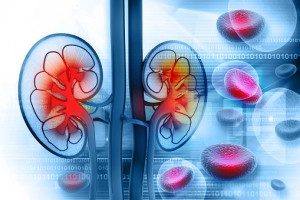 GERD Awareness Week runs from November 23 through November 29. Gastroesophageal reflux disease (GERD) is when there is backflow of the stomach’s contents into the esophagus. There are many complications resulting from GERD, but the condition can be well managed as long as you talk to your doctor.
GERD Awareness Week runs from November 23 through November 29. Gastroesophageal reflux disease (GERD) is when there is backflow of the stomach’s contents into the esophagus. There are many complications resulting from GERD, but the condition can be well managed as long as you talk to your doctor.
In light of GERD Awareness Week, we present our articles that discuss GERD along with other complications, including kidney disease, scleroderma, heartburn, acid reflux, sleep apnea, and digestive health.
Kidney disease risk increases with certain acid reflux medications
Advertisement
New findings suggest that certain acid reflux medications could increase the risk of kidney disease. The medications are known as proton pump inhibitors (PPI) and are part of the top 10 most popular prescribed medications. The study will be presented at ASN Kidney Week 2015 from November 3 to 8 at the San Diego Convention Center in San Diego, CA.
The prevalence of kidney disease is on the rise, affecting more than 20 million Americans. Risk factors for kidney disease include diabetes and high blood pressure, but medications can play a role, too. Two recent studies revealed the role of proton pump inhibitors and how they can increase the risk of kidney disease. Continue reading…
 Scleroderma, a GERD risk due to excess collagen in esophagus
Scleroderma, a GERD risk due to excess collagen in esophagus
Scleroderma is a gastroesophageal reflux disease (GERD) risk due to excess collagen in the esophagus. Scleroderma (systemic sclerosis) is a group of diseases that result in the hardening of the skin and connective tissues. Typically, scleroderma affects just the skin, but in some individuals, it can also affect other parts of the body like blood vessels, for example.
Scleroderma is considered an autoimmune disease in which the body produces excess amounts of collagen. Collagen deposits lead to hardening of the skin and other organs.
Scleroderma typically affects women more than men, and there is currently no cure for the disease. However, treatments are available to help ease the symptoms and improve daily life. Continue reading…
 Plagued by heartburn and acid reflux: Gastroesophageal reflux disease (GERD)
Plagued by heartburn and acid reflux: Gastroesophageal reflux disease (GERD)
That burning sensation followed by a foul taste in your mouth happening far too often when you eat?
Forget blowing through those bottles of antacids and get to the bottom of your problem. It could be gastroesophageal reflux disease, commonly called GERD. It definitely makes the list of the top 10 digestive diseases in America. But why?
Gastroesophageal reflux disease symptoms are not only uncomfortable. They can be serious. Is it our diet of common heartburn triggers such as fatty or fried foods (be honest here!), tomato sauce, alcohol, and caffeine that may make heartburn worse? Continue reading…
 GERD and Barrett’s esophagus patients have obstructive sleep apnea, poor sleep quality
GERD and Barrett’s esophagus patients have obstructive sleep apnea, poor sleep quality
Gastroesophageal reflux disorder (GERD) and Barrett’s esophagus (BE) patients have higher rates of obstructive sleep apnea and poor sleep quality. Nearly 20 percent of Americans suffer from GERD, which is chronic heartburn or acid regurgitation. Numerous previous studies have explored the association between GERD and poor sleep quality and have found that GERD patients, on average, have worse sleep, including insomnia, sleep disruptions, and overall low quality of sleep.
Advertisement
Research has also shown that GERD is a factor for obstructive sleep apnea (OSA), which is a sleep disorder characterized by the stoppage of breathing throughout the night. GERD may contribute to sleep apnea by causing upper airway inflammation from occurring, but sleep apnea may lead to GERD, because it causes an increase in intra-thoracic pressure. Continue reading…
 Improving your digestion after 60: How aging affects your digestive health
Improving your digestion after 60: How aging affects your digestive health
Nearly 40 percent of older adults have issues with digestion related to aging, and it has a lot to do with our bodies changing as we age, including our digestive health. A variety of factors take a toll on our digestive system as we progress through life, including our lifestyle and any medications we might be taking.
It is no secret that aging places us at a higher risk for all kinds of health conditions. As we age, some bodily functions slow down, including digestion. When it comes to digestive health in our older years, the muscles in the digestive tract can become stiffer and weaker. The tissues are also more apt to become damaged, since new cells just don’t form as quickly as they did before. Many people seem surprised by the effects of aging on the digestive system. They think they are in the minority. However, nothing could be further from the truth. Continue reading…
